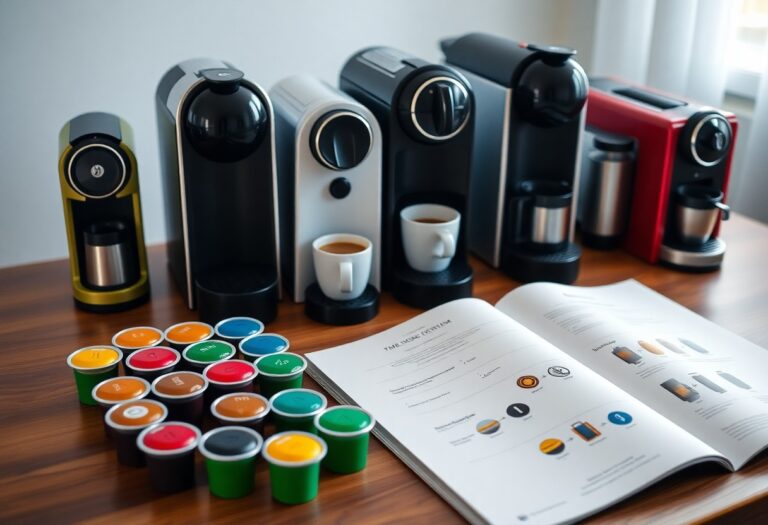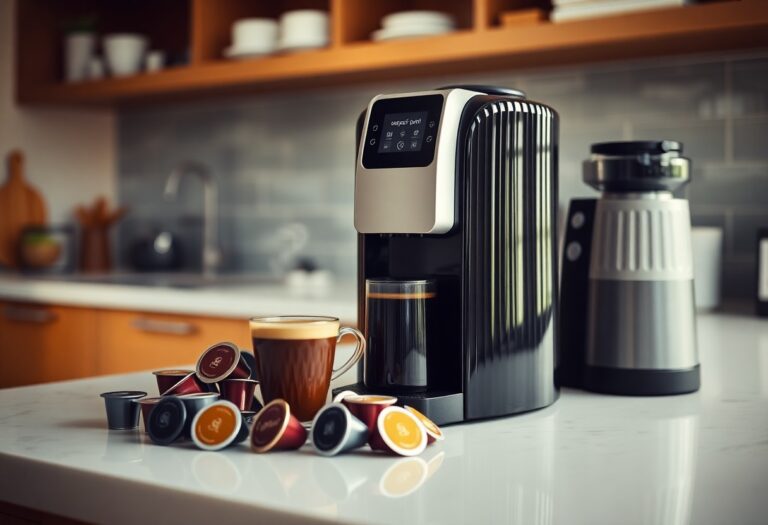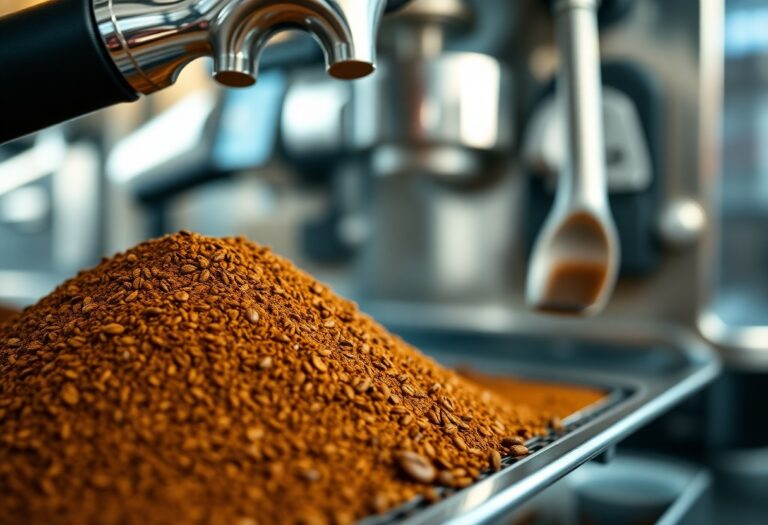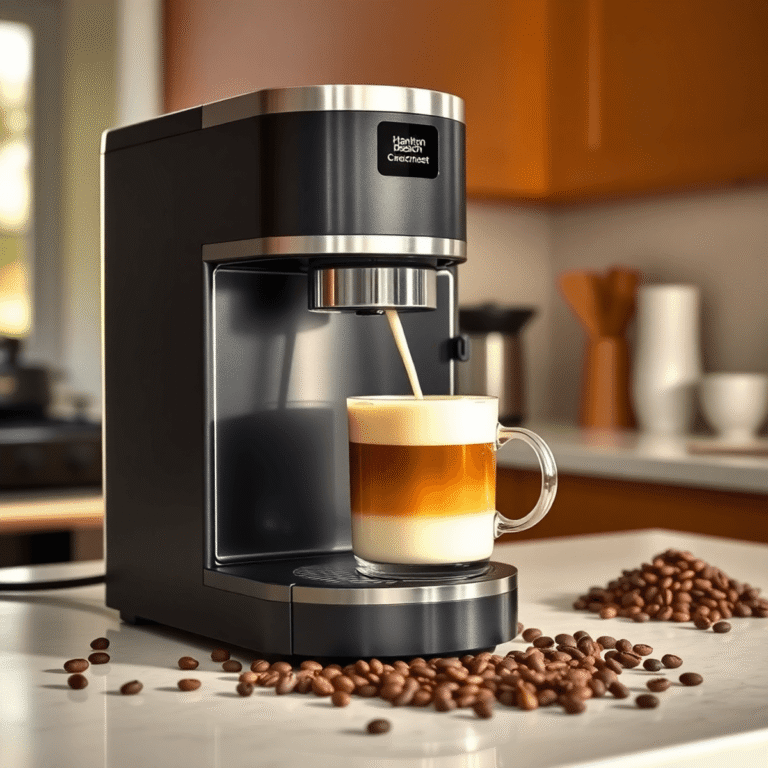What is Descaling Solution for Coffee Machine – Chemical Treatment
Solution to your coffee machine’s mineral buildup challenges lies in using a descaling solution. This chemical treatment effectively eliminates limescale and calcium deposits that accumulate over time, ensuring optimal performance and prolonging the lifespan of your machine. By using a descaling solution, not only do you enhance the taste of your coffee, but you also prevent potential damage to vital components. Proper maintenance with a descaler is key to enjoying a seamless brewing experience, so understanding how it works can significantly benefit you and your coffee rituals.

Key Takeaways:
- Descaling solution is a chemical treatment specifically designed to remove mineral buildup, particularly calcium and lime, from coffee machines.
- Regular use of descaling solutions can enhance the performance and longevity of your coffee machine by ensuring optimal water flow and heat transfer.
- These solutions typically contain weak acids, such as citric or acetic acid, which effectively dissolve mineral deposits without damaging the machine.
- Descaling frequency depends on water hardness; areas with harder water may require more frequent descaling compared to those with softer water.
- Always follow the manufacturer’s instructions for the proper use of descaling solutions to ensure the best results and maintain warranty coverage.
Unpacking the Role of Descaling Solutions in Coffee Machines
Descaling solutions serve as important agents in maintaining the efficiency and longevity of your coffee machine. Their primary function is to dissolve mineral deposits that accumulate over time due to hard water usage, preventing clogs and ensuring consistent water flow. This not only enhances the flavor of your coffee but also protects the internal components from damage. Regular descaling can yield a noticeable improvement in your brewing experience, allowing your beloved coffee machine to perform at its best.
The Chemistry Behind Descaling Agents
Descaling agents typically rely on acidic compounds such as citric acid or acetic acid to break down scale buildup. The acidic environment effectively targets and neutralizes compounds like calcium and magnesium, which contribute to mineral deposits. As these substances dissolve, they can be easily flushed away, restoring your machine’s functionality.
Common Ingredients and Their Functions
Common ingredients found in descaling solutions often include citric acid, lactic acid, and phosphoric acid. Citric acid, derived from citrus fruits, not only tackles mineral buildup but also adds a fresh scent to your brewing process. Lactic acid helps in providing a more thorough clean by breaking down stubborn residues. Meanwhile, phosphoric acid is particularly effective against calcium carbonate, a prevalent scale component.
Most descaling solutions combine these acids for maximum efficacy. For instance, citric acid is celebrated for its ability to dissolve calcium deposits efficiently while being less aggressive on your machine’s internal components than stronger acids. Lactic acid enhances cleaning power without risking harm, making it ideal for frequent use. Lastly, phosphoric acid addresses tougher deposits that other acids might struggle with, ensuring a comprehensive cleaning. By understanding these components, you can select a descaling solution that best fits your coffee machine’s needs and your local water quality issues.

The Consequences of Neglecting Descaling
Ignoring the need to descale your coffee machine can lead to significant drawbacks that affect both your brewing process and the lifespan of your device. Neglecting this crucial maintenance can result in *clogged pipes*, decreased water flow, and a noticeable decline in the overall efficiency of your beloved machine. The buildup of mineral deposits not only hinders functionality but may also create an environment conducive to mold and bacteria growth, posing a health risk. Ultimately, this oversight can become costly, as repairs or replacements could be necessary sooner than expected.
Impact on Coffee Quality and Flavor
The taste of your coffee heavily depends on the quality of the water used for brewing. When you don’t descale regularly, mineral buildup and scale can impart off-flavors to your coffee, resulting in a bitter or sour taste. Even the aroma can be negatively impacted, diminishing your overall coffee-drinking experience. You might notice that your once-delicious brew now tastes flat or metallic, ruining that perfect morning pick-me-up.
Long-term Effects on Machine Performance
Over time, neglecting descaling can lead to serious *malfunctions* within your coffee machine. The accumulation of scale affects heating elements and water paths, which can cause overheating, component wear, and even premature burnout of parts. With forced strain on your machine, you’re likely to encounter inconsistent brews and a rise in maintenance costs. Such deterioration not only affects the immediate performance of your coffee maker but can also drastically shorten its operational life, making regular descaling a worthy investment for any coffee enthusiast.
Regular descaling extends the longevity of your coffee machine by keeping components clean and free from obstructions. For example, a well-maintained espresso machine can last up to 10 years, whereas one that hasn’t been descaled frequently may only last half that time. By using descaling solution, you’re actively preventing degradation, ensuring your pump and heating elements function efficiently. This not only improves your coffee’s quality but also saves you from unexpected repair costs, ultimately creating a more enjoyable brewing experience.
Choosing the Right Descaling Solution
Selecting the appropriate descaling solution for your coffee machine is necessary for its maintenance and optimal performance. Evaluate your machine type, check manufacturer recommendations, and consider the ingredients in the solution. The right choice not only keeps your machine running smoothly but also ensures that your coffee taste remains top-notch and free from chemical residues.
Comparing Commercial Products vs. Homemade Solutions
| Commercial Products | Homemade Solutions |
| Generally more effective against mineral buildup | Often uses common household items like vinegar |
| Formulated specifically for various coffee machines | Can lack the precision of commercial formulas |
| Quick and easy to use, ready-made | May require measurement and mixing |
| May include protective agents for machine parts | Less likely to have protective components |
Considerations for Different Types of Coffee Machines
Different coffee machines have unique descaling requirements, so understanding your specific model is necessary. For example, espresso machines often need gentle solutions to avoid damaging delicate parts, while single-serve pod machines may require more robust solutions due to their frequent use. Additionally, whether your machine is manual or automatic influences the frequency and type of descaling needed. The right choice of descaling solution should allow efficient cleaning while protecting your machine’s parts.
- Espresso machines require gentle solutions.
- Single-serve machines benefit from robust treatments.
- Automatic machines may need more frequent descaling.
- Manual systems demand gentle care.
- Identifying your machine type is necessary for proper maintenance.
| Machine Type | Optimal Descaling Solution |
| Espresso Machines | Gentle, specialized formulas |
| Single-Serve Machines | Robust commercial solutions |
| Automatic Drip Machines | Moderate solutions with acid-base balance |
| Manual Brewing Systems | Vinegar or natural descaling agents |
Expert Recommendations for Effective Descaling
Timely descaling is important for prolonging your coffee machine’s lifespan and ensuring a superior brewing experience. Experts suggest reviewing your machine’s manual for brand-specific recommendations while generally adhering to a schedule of every 3-6 months. Factors like water hardness and frequency of use may merit more frequent treatment.
Frequency and Timing of Descaling Sessions
Descaling sessions should be adjusted based on your water quality and machine usage. For those using hard water, a monthly to bi-monthly descaling may be necessary. If you primarily use soft water and your machine sees occasional use, every 6 months may suffice.
Step-by-Step Guide to Proper Descaling Techniques
Follow a systematic approach to descale effectively. Starting with high-quality descaling solution, ensure your machine is empty and clean, then mix the solution as per guidelines, allowing it to pass through the system. Finally, rinse thoroughly to eliminate any residue.
Step-by-Step Descaling Process
| Steps | Description |
|---|---|
| 1. Prepare | Empty and clean your machine, making sure no coffee grounds remain. |
| 2. Mix Solution | Combine descaling solution with water according to the package instructions. |
| 3. Run Cycle | Pour the solution into the reservoir and initiate the brewing cycle. |
| 4. Rinse | Run multiple cycles with plain water to ensure all solution is cleared. |
Utilizing this step-by-step guide, focus on precision to avoid damaging your machine. Make sure to read any specific instructions related to your coffee maker model, as some machines may require additional steps or offer unique features that enhance the descaling process, ensuring optimal performance and taste with every cup.
The Environmental Perspective on Descaling Solutions
The environmental impact of descaling solutions often raises concerns among coffee enthusiasts. Many traditional descalers are based on harmful chemicals that can contaminate water systems if not disposed of properly. Furthermore, the production and packaging of these chemicals contribute to overall pollution. Therefore, understanding the environmental implications of the descalers you use is paramount to making informed and eco-conscious choices that align with your values.
Eco-Friendly Alternatives and Their Effectiveness
Alternative descaling solutions, such as vinegar or citric acid, offer environmentally friendly options for maintaining your coffee machine. These natural substances effectively remove mineral buildup without the harsh side effects associated with synthetic chemicals. While they may require a slightly longer application time or more frequent use, their gentler composition ensures less impact on both your machine and the environment, allowing you to enjoy your coffee with peace of mind.
Industry Trends Towards Sustainable Practices
Recent years have seen a noticeable shift in the coffee industry towards sustainable practices, extending even to descaling solutions. Many manufacturers are now prioritizing eco-friendly formulations and recyclable packaging, reflecting a growing consumer demand for environmentally responsible products. Innovations in natural ingredients and biodegradable options are becoming common, helping you make more sustainable choices for your coffee maintenance.
This trend isn’t just about marketing; brands are recognizing the long-term benefits both for the planet and their business. For example, companies like Breville and De’Longhi are incorporating sustainable practices by developing descalers made from organic components, drastically reducing their ecological footprint. Additionally, consumer awareness is at an all-time high, driving brands to invest in research for biodegradable yet effective descaling solutions, ensuring you can keep your coffee machine in top shape while nurturing the environment.
Final Words
So, understanding what a descaling solution is for your coffee machine can significantly enhance its performance and lifespan. This chemical treatment helps remove mineral buildup, ensuring that your coffee always tastes fresh and aromatic. Regular use of a descaling agent can prevent clogs and improve the efficiency of your machine. To learn more about the different types of descaling agents and their proper use, check out this article on Descaling agent.
FAQ
Q: What is a descaling solution for coffee machines?
A: A descaling solution is a chemical treatment specifically designed to remove mineral build-up, particularly calcium and magnesium deposits, from the internal components of coffee machines. These minerals accumulate over time due to the use of hard water, which can negatively affect the performance and taste of your coffee. Descaling solutions typically contain mild acids, such as citric or acetic acid, which effectively dissolve these deposits without damaging the machine.
Q: How often should I descale my coffee machine?
A: The frequency of descaling depends on the water quality in your area and how often you use your coffee machine. Generally, it is recommended to descale every 1-3 months if you use hard water, or at least every 3-6 months for soft water. It’s a good practice to refer to your coffee machine’s user manual for specific recommendations, as some machines may have different needs.
Q: Can I make my own descaling solution at home?
A: Yes, you can create a homemade descaling solution using common household items, such as vinegar or citric acid. A mixture of equal parts water and white vinegar can effectively remove scale. Alternatively, dissolving 1-2 tablespoons of citric acid in water can also work as an effective descaler. However, make sure to thoroughly rinse the machine afterward to avoid any lingering taste or odor.
Q: Are there any risks associated with using descaling solutions?
A: While descaling solutions are designed to be safe for coffee machines, it’s important to use the product as directed by the manufacturer. Overusing the solution or using products not intended for coffee machines can lead to damage. Additionally, if the descaling solution is not well-rinsed out after use, it could potentially affect the flavor of your coffee, so always follow the rinsing instructions carefully.
Q: Do descaling solutions have an impact on coffee taste?
A: Yes, using a descaling solution appropriately can improve the taste of your coffee. When mineral deposits build up in your coffee machine, they can negatively impact the brewing process and affect the flavor extraction of your coffee. Regular descaling helps ensure that your coffee machine operates at optimal efficiency, thus enhancing the overall taste and quality of the brewed coffee.







